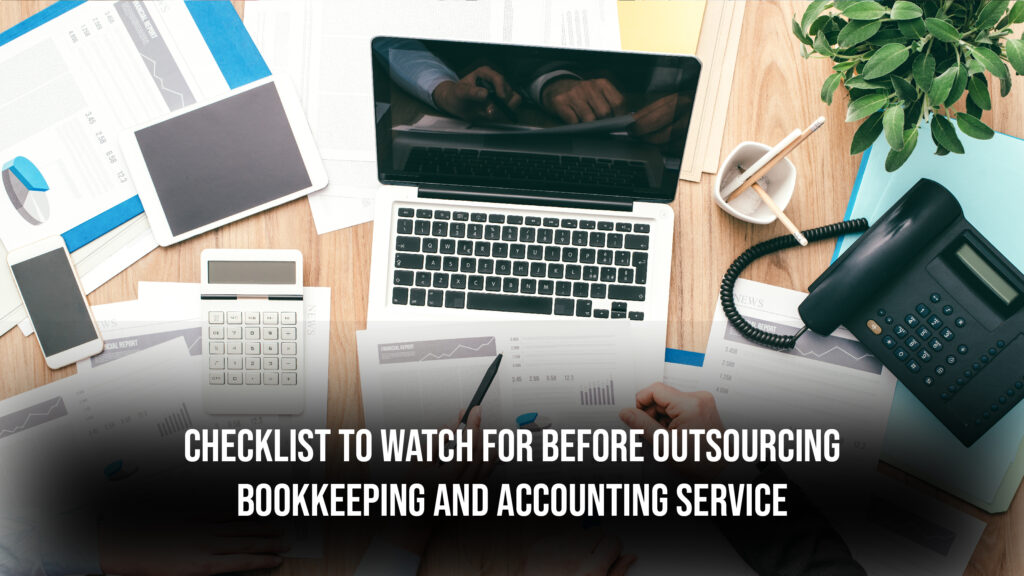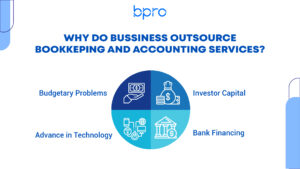Accounting and bookkeeping are critical processes in making a business operational, profitable, and successful. Whether a business is in the initial phase of development or well-established, the owners nor the in-house team may not have the time and expertise to manage every aspect of the business's finances needed to remain operational. However, businesses don't need to stress now, as heaps of outsourced bookkeeping and accounting services are out in the market that is always ready to assist struggling companies to streamline payroll, bookkeeping, and other essential financial operations.
Outsourcing bookkeeping and accounting services provide businesses with easy access to professional assistance for time-consuming, hectic, and complex financial processes. This also cuts down the cost of hiring additional full-time bookkeepers or accountants as well as increasing the salary of an in-house team. Additionally, outsourcing also boosts business efficiency along with credibility, allowing the team to focus on their designated roles while the remote team of financial analysts handles the business challenges.
Outsourced Bookkeeping and Accounting - A Brief Introduction
Being an entrepreneur running a successful business sometimes means keeping an eye on everything. However, handling this responsibility and making sure that business goals are being achieved get messy and hard to cope with. But there is a specific and critical area in every company that doesn't need creative inputs but requires attention - accounting and bookkeeping.
Today, most businesses seem to use outsourcing methods to streamline their IT and HR procedures. Still, there are many more ways this practice can give them competitive advantages. Managing a firm’s finance and keeping the records up to date is a niche where a professional bookkeeping and accounting company can lend a hand. Outsourcing means onboarding another company that can manage business books and accounts. These services usually include everything from daily transactions, accounts receivable/payable, payroll solutions, and invoices to calculating taxes. However, some well-established firms also provide consultation services as well.
In addition to this, in some cases, outsourcing is also commonly known as subcontracting. While outsourced accounting and bookkeeping in a broader sense are sometimes called Finance and Accounting Outsourcing (FAO), which means that a firm’s some or all the financial functions are handled by an external company.
Crucial Factors that Provokes Business to Outsource Financial Services
Every business operating in this world has a distinctive working model, yet everyone’s goal is to float in this fast-moving economy. So companies always know the suitable time when they need to move their accounting and bookkeeping to be handled by an outsourced firm. However, there are some similar or most common reasons why businesses look out for outsourcing mentioned below;
- Budgetary Problems: Unstable and decreased cash flow forces businesses to make hard choices to save up. Since accounting and bookkeeping is not core procedure for many companies, it's simple to outsource them. This practice reduces the cost and frees up resources from the extra burden that can be late used on more critical operations, making the business credible and retaining clients.
- Investor Capital: To get an investor or once someone starts looking at a business, it's viable to be capable of showing them detailed as well as accurate financial status on paper. However, to make proper documentation and provide insights into finance, companies usually outsource financial management services.
- Bank Financing: When startups, small businesses, and enterprises are ready to scale operations they may require bank financing. To get loans, banks need detailed business financial records, this is another reason businesses seem to go for outsourcing.
- Advances in Technology: As technologies are getting advanced, cheap communication and enhanced networking infrastructures are reducing the dependency on working remotely. This has paved wider opportunities for business. On another hand, accounting technology has also transformed at the same pace, so a firm might not get left behind with its bookkeeping. However, it costs a lot to integrate tech-driven tools or software. Thus, for this reason, businesses get outsourced services.
- Significant Growth: when businesses experience an increase in sales the company’s cash flow or revenue automatically spikes. This means that more resources and time is required to manage operations accurately. However, to handle and to be quite sure that things get streamlined, it’s simple to outsource.
- Changing the Function of Accounting: Chief Financial Officers (CFOs) usually get pressured to provide owners with valuable data or insights that can help them take fruitful decisions at the right time along with raising the standards to help businesses comply with the accounting legislation. Thus, outsourced services can also help businesses at this stage as well.
Top 9 Key Points Businesses need to Watch for Before Outsourcing
When it comes to creating a checklist for outsourcing accounting and bookkeeping services, businesses need lots of things to watch for to make the right decision. However, the process is not that easy but it holds the potential of streamlining business financial operations. Following is the checklist that will give businesses a clear idea about what they need to have before picking outsourced services.
- Experience: It's important to do quality research in order to determine the experience of the firm. This will allow businesses to know whether they are capable of handling their systems, depending on the factor that the company’s operations will scale in the near future.
- Flexibility to gradual outsourcing: Businesses need to note down the services they are in need of. Such as tax filing, invoices, payrolls, and much more. However, accounting is all about gradual outsourcing. Therefore, it's viable and also suggested to make ties with firms having flexible solutions.
- Trust: traditional means of determining a company’s credibility or depending on word of mouth is as valuable today as it was before. Contact their clients or partners to find out more about their competence and honesty.
- Time: When outsourcing bookkeeping and accounting services, it's a must-do check how fast they are in terms of delivering the processes. As the key factor of outsourcing is saving time, it should be thoroughly verified before getting a firm on board.
- Cost: This is another crucial factor that businesses must look for. The outsourced company should provide market-competitive pricing plans. However, the firm should cost lower than it could cost by handling through an in-house team, resulting in an increase in business revenue.
- Resources: Businesses need to validate the resources before signing a contract with the outsourcing company. With more resources available with the vendor, business operations can be processed faster. Thus, resulting in saving time on daily tasks.
- Quality of Service: Companies need to inquire about and assess the quality of services from their previous tasks. With more tasks performed and highly skilled professionals, the outsourcing company can render fruitful results. However, firms having sound experience in handy in every kind of business operation are the best option to get outsourced.
- Innovation: With passionate teams, outsourcing bookkeeping and accounting companies must have the ability to come up with innovative ideas. This is a crucial factor as it always plays a viable role in reducing operational costs while boosting the company’s revenue.
- Infrastructure and Tech Capabilities: For a startup or small business investing in technology-driven tools can be costly. However, outsourcing bookkeeping and accounting service providers that have advanced tools can help businesses to become market competitive without investing in advanced tech tools.

